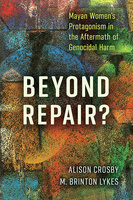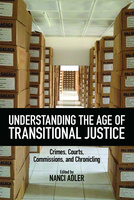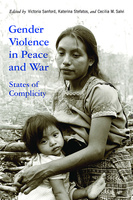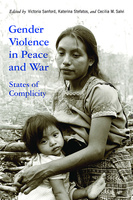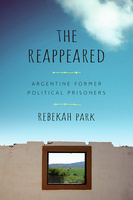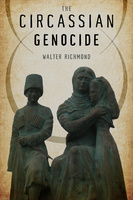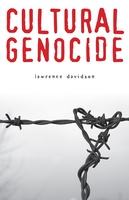Beyond Repair?
Mayan Women’s Protagonism in the Aftermath of Genocidal Harm
Beyond Repair?
Mayan Women's Protagonism in the Aftermath of Genocidal Harm
Understanding the Age of Transitional Justice
Crimes, Courts, Commissions, and Chronicling
Understanding the Age of Transitional Justice
Crimes, Courts, Commissions, and Chronicling
A Rhetorical Crime
Genocide in the Geopolitical Discourse of the Cold War
Gender Violence in Peace and War
States of Complicity
Gender Violence in Peace and War
States of Complicity
Three Centuries of Conflict in East Timor
The Reappeared
Argentine Former Political Prisoners
Genocide as Social Practice
Reorganizing Society under the Nazis and Argentina's Military Juntas
Hidden Genocides
Power, Knowledge, Memory
Why are some cases of genocide prominently remembered while others are ignored, hidden, or denied? In this collection, contributors approach the question from a variety of perspectives and case studies, including the suppression of discussion about indigenous populations in the Americas and Australia, the reasons why the genocide of the Armenians, Assyrians, and Greeks long remained out of sight, and the violence that was the precursor to and the aftermath of the Holocaust.
Hidden Genocides
Power, Knowledge, Memory
Why are some cases of genocide prominently remembered while others are ignored, hidden, or denied? In this collection, contributors approach the question from a variety of perspectives and case studies, including the suppression of discussion about indigenous populations in the Americas and Australia, the reasons why the genocide of the Armenians, Assyrians, and Greeks long remained out of sight, and the violence that was the precursor to and the aftermath of the Holocaust.
The Circassian Genocide
This book chronicles the history of the war between Russia and Circassia, describes in detail the final genocidal campaign, and follows the Circassians in diaspora through five generations as they struggle to survive and return home. It updates the story to the present day as the Circassian community works to gain international recognition of the genocide as the region prepares for the 2014 Winter Olympics in Sochi, the site of the Russians’ final victory over the Circassians.
Rendition to Torture
Many Americans were surprised following the attacks of 9/11 at how easily the United States embraced torture as well as the supposedly lesser evil of cruel, inhuman, and degrading treatment. Extraordinary rendition—sending people captured in the “war on terror” to nations long counted among the world’s worst human rights violators—hid from the public eye cruel and bloody interrogations. In Rendition to Torture, Alan W. Clarke explains how the United States adopted torture as a matter of official policy; how and why it turned to extraordinary rendition as a way to outsource more extreme, mutilating forms of torture; and outlines the steps the United States took to hide its abuses.
Cultural Genocide
Cultural Genocide establishes a theoretical basis for understanding why groups can be readily brought to seek the elimination of out-groups using the tactic of cultural destruction. Lawrence Davidson applies his theory to four uses of cultural genocide, with two pre-Holocaust case studies and two post-Holocaust case studies. He examines the mechanisms that may be used to combat today’s cultural genocide as well as the contemporary social and political forces at work that must be overcome in the process.
Facing the Khmer Rouge
A Cambodian Journey
As a child growing up in Cambodia, Ronnie Yimsut played among the ruins of the Angkor Wat temples, surrounded by a close-knit community. As the Khmer Rouge gained power and began its genocidal reign of terror, his life became a nightmare. In this stunning memoir, Yimsut describes how, in the wake of death and destruction, he decides to live. Facing the Khmer Rouge shows Ronnie Yimsut’s personal quest to rehabilitate himself, make a new life in America, and then return to Cambodia to help rebuild the land of his birth.
We Cannot Forget
Interviews with Survivors of the 1994 Genocide in Rwanda
During a one-hundred-day period in 1994, Hutus murdered between half a million and a million Tutsi in Rwanda. The numbers are staggering; the methods of killing were unspeakable. Utilizing personal interviews with trauma survivors living in Rwandan cities, towns, and dusty villages, We Cannot Forget relates what happened during this period and what their lives were like both prior to and following the genocide.
Through powerful stories that are at once memorable, disturbing, and informative, readers gain a critical sense of the tensions and violence that preceded the genocide, how it erupted and was carried out, and what these people faced in the first sixteen years following the genocide.
We Cannot Forget
Interviews with Survivors of the 1994 Genocide in Rwanda
During a one-hundred-day period in 1994, Hutus murdered between half a million and a million Tutsi in Rwanda. The numbers are staggering; the methods of killing were unspeakable. Utilizing personal interviews with trauma survivors living in Rwandan cities, towns, and dusty villages, We Cannot Forget relates what happened during this period and what their lives were like both prior to and following the genocide.
Through powerful stories that are at once memorable, disturbing, and informative, readers gain a critical sense of the tensions and violence that preceded the genocide, how it erupted and was carried out, and what these people faced in the first sixteen years following the genocide.

